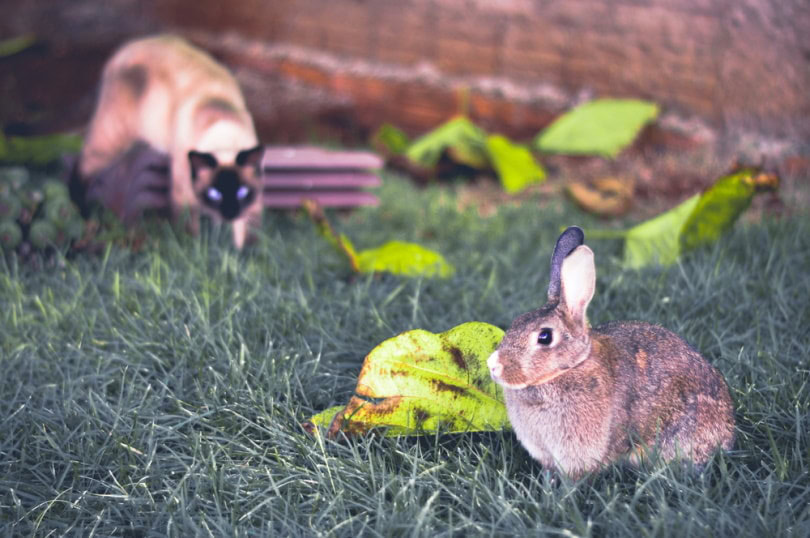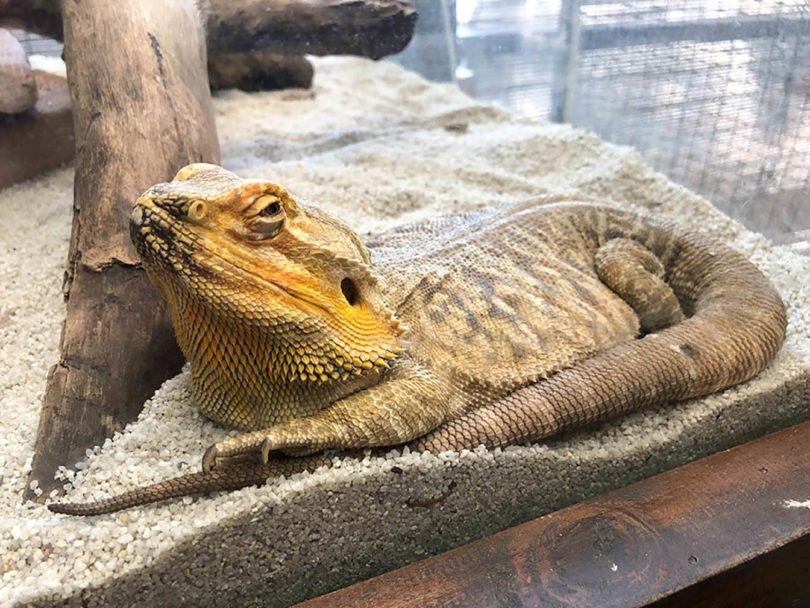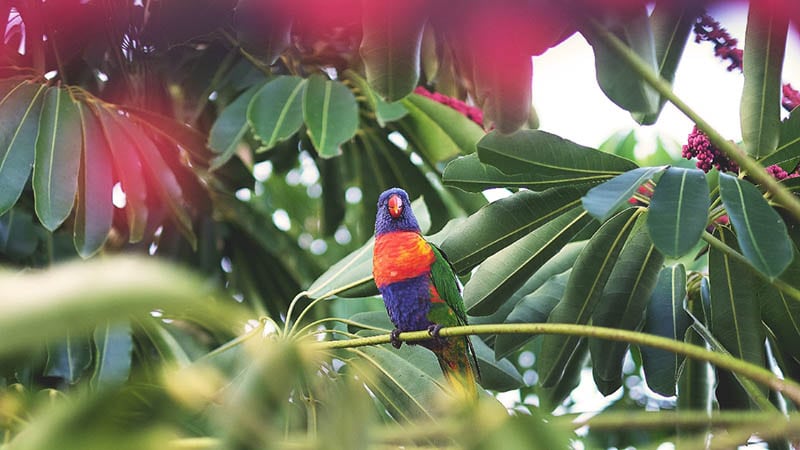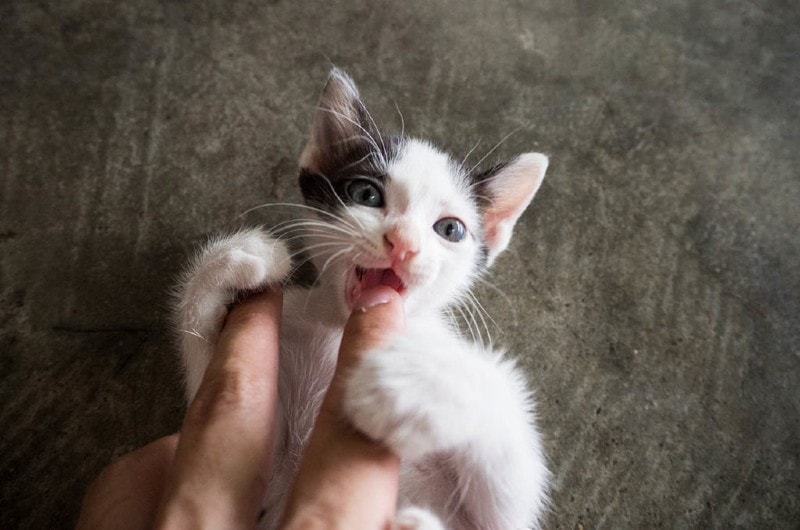VET APPROVED

The information is current and up-to-date in accordance with the latest veterinarian research.
Learn more »Click to Skip Ahead
Everyone knows that cats love to chase, hunt, and kill mice. Most cat toys are even in the shape of mice. If you’ve ever seen a cat stalk and pounce on one of these mouse toys, then you know just how much hunting prowess your cat has. Granted, mice aren’t the only type of creature that cats like to hunt. Many cat owners have stories about their cat bringing them dead birds as a tribute.
Birds and mice are very small animals, though. Cats are much larger than mice and birds, but will they still attack, kill, and even eat animals that are larger? What about, say, a rabbit?
The truth is, it’s in the cat’s nature to hunt and kill. They even play with their freshly caught victims and use them to teach their kittens basic hunting skills. If the opportunity presents itself for a cat to kill a rabbit, you can bet the cat is going to take it and attack the rabbit.

Obligate Carnivores
Similar to large felines and other known hunters, cats are obligate carnivores, which means that they get all of their nutrition from animal sources. They don’t eat fruits, vegetables, or any other type of plant matter. Instead, they feed on the animals that eat plant matter.
Everyone knows that cats have an instinct to kill mice and birds. Though it may seem hard to believe that your cat, who turns their nose up at the food you offer if it’s the wrong consistency, isn’t a very picky eater, when it comes to freshly caught and killed prey, cats will eat a very diverse range of animals.
Aside from the small mammals like squirrels, chipmunks, mice, rats, rabbits, and guinea pigs, and the small non-mammal animals like birds, lizards, and frogs, cats have less commonly been known to catch and eat fish.
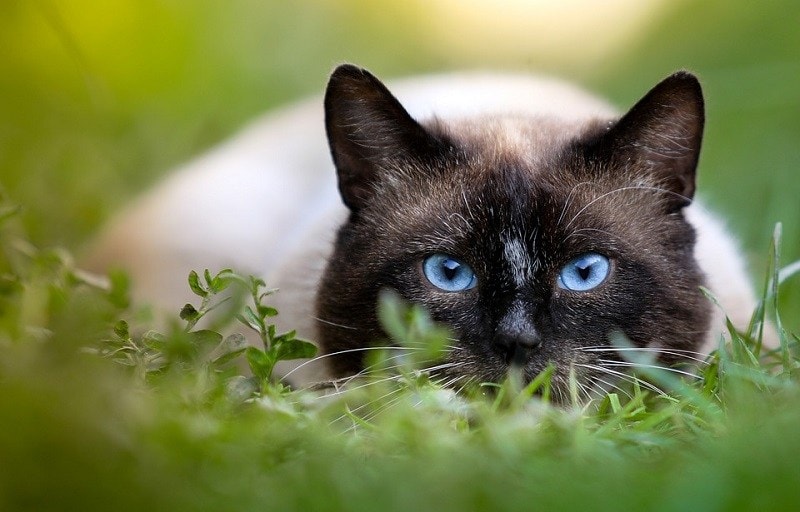
Proficient Hunters
Beyond being obligate carnivores, felines are also naturally proficient and skillful hunters, and they love to exercise this ability. You’ve likely seen your cat stalk and pounce on their toys many times before. This is because cats don’t just kill out of the need for food; they do it for fun, experience, and exercise. Cats have an instinct to hunt and kill, and they’re very adept at it.
If a cat sees an opportunity to hunt a sizable, defenseless mammal like a rabbit, you best believe that they will jump at the chance. That’s not to say that every cat will attack every rabbit they see, but if you’ve got a sizable cat around and they see an unprotected bunny…well, let’s just say it’s open season.
Will a Cat’s Bite Kill a Rabbit?
Cats have a rather strong bite. You can survive it with ease due to your size, but smaller creatures like rabbits will be in big trouble after a cat bite. Furthermore, cat saliva contains bacteria that will lead to tissue infections. So, even if the rabbit doesn’t die immediately, it may likely die shortly after due to the severity of the wounds and bacterial infection.
Do Cats Always Eat the Rabbits They Kill?
Humans often have this fairy tale view of nature like everything is peaceful and harmonious. Some people even claim that only humans are sadistic enough to kill for fun, but that’s simply not true. Cats kill for fun as this is instinctual to them, and they love to play with their prey while killing them slowly.
Because of their hunting instinct, cats have been known to kill many creatures they don’t even eat. Granted, a cat certainly will eat a rabbit if the cat is hungry enough. But house cats are not usually hungry enough to eat what they kill. They’re also rather happy with their gourmet food that you prepare for them. But the instinct to hunt and kill is strong in a feline, so they may kill a rabbit just for the fun of it, with no intention of eating it.
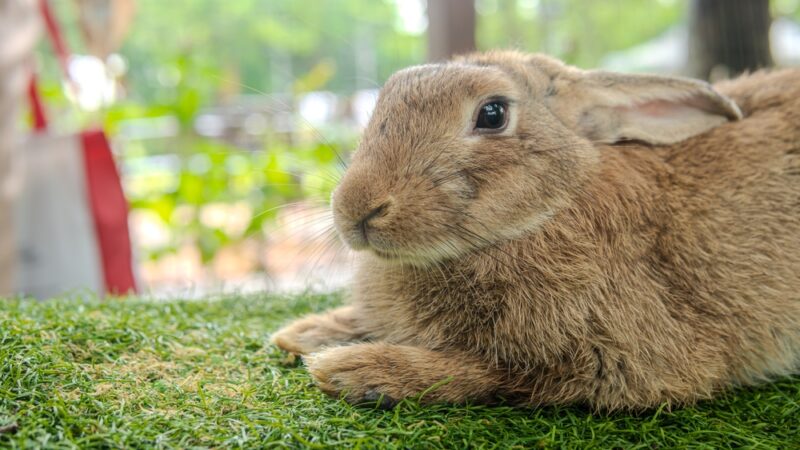
Potential Dangers of Eating Rabbits for Cats
Just because a cat can eat a rabbit doesn’t mean they should. Rabbits may carry tularemia. This often kills large portions of rabbit and rodent populations, though it can be just as hazardous for your cat. People can also contract the illness, most often from tick bites and contaminated water, but cat bites and scratches could be a source of infection. Besides tularemia, cats can pick up fleas and ticks from rabbits.
How to Keep Pet Rabbits Safe From Cats
The other side of the coin is that pet rabbits can be in danger from cats around them. If you have a cat and a rabbit in the same household, then you’ll need to build them a cat-proof enclosure, something with metal fencing that can withstand a cat’s claws and teeth. Still, the enclosure or hutch should be in an area well outside of your cat’s usual presence, as the scent of the cat may cause ongoing fear and negatively impact the rabbit’s health, despite them not seeing one another. With your rabbit safely inside this cat-proof enclosure, you’ll have nothing to worry about.

Conclusion
Cats will kill and eat many different types of small animals, from mice to birds and up to rabbits. In fact, a cat might even kill a rabbit with no intention of eating it. Cats love to hunt and kill, and it’s deep within their instinct to do so. If you have a pet cat, you should try to prevent them from eating rabbits, as they may be at risk of contracting tularemia, alongside the negative impact they have on local wildlife through hunting. For rabbit owners, ensure your rabbit is safely tucked away in a cat-proof enclosure to keep them safe from neighborhood cats.
Related Reads:
- Will My Cat Eat My Bearded Dragon If They Get the Chance? Facts & FAQ
- How to Stop a Cat From Bringing Dead Mice Home: Vet-Reviewed Methods
Featured Image Credit: Lucas Baisso, Shutterstock
